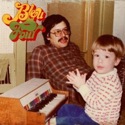
Bleu
Four
The Major Label
Bleu is William James McAuley III, a veteran of Boston’s power pop scene, who has over the past decade put out one major label record (2003’s occasionally brilliant but often over-produced Redhead), a handful of more independent releases (2009’s A Watched Pot) and even a power-pop supergroup effort (L.E.O with members of Jellyfish, Hanson, and Chicago). For his latest solo effort, Bleu turned to the Kickstarter website to raise $40,000 in pledges from an impressive fanbase. The resulting album, issued on Bleu’s cheekily named The Major Label, showcases a talented pop craftsman with a versatile voice but also a guy who could stand to sharpen his songwriting and let us into his world a bit more.
Opener “Singin’ in Tongues,” which Bleu counts off Springsteen-style, is full of energy and swagger with a gang sing-along la-la-la chorus. He sings about “a guy who looked like Hendrix and sang like a shark.” It’s a reasonably fun tune but with a certain amount of you-had-to-be-there inside joke-iness that pervades much of the record.
“B.O.S.T.O.N.” is the real crowd-pleasing tour de force here. Paying tribute to his adopted hometown with a tune that panders gratuitously, it has all the subtlety of a beer commercial. But Bleu demonstrates a good sense of humor and a mastery of the pop hook. The song’s last verse has him rising up from the casket at his own funeral to proclaim his allegiance to the titular city at the top of his lungs.
The first of the album’s ballads (there are perhaps a few too many), “How Blue” is enhanced with a string section and a pretty falsetto vocal.
“Dead in the Mornin’” on the other hand is a terrific horn-backed rave up with a near religious fervor. Oddly, Bleu chooses to fade the song up seemingly in mid-stream with the band reaching some ecstatic high point. A few minutes later, the song fades out again just as elusively. Bleu and friends may have been jamming for eight minutes on either side, there’s no way to tell. And that makes it ultimately one of the album’s more frustrating moments as well. It’s like we’ve arrived at the party too late, after everybody is already drunk and having a good time. Then, just as we’ve found the groove, it’s time to leave the party. You want to join in the fun (and it sounds like Bleu is having a blast) but there’s no build up or point of reference to latch onto. It’s a snippet of a performance without the necessary context.
The lazy acoustic ballad “In Love with My Lover,” with a gentle rain falling in the background, is frustrating for a completely different reason: it’s disappointingly generic and repetitive in the lyric department. Although the song builds to a pounding, horn section-backed bridge, it doesn’t seem to earn it honestly. It just listlessly floats along until it gets there rather than building the tension. Bleu turns in a nice vocal but I sure wish there was something more going on here.
Bleu brings back the string section for “When the Shit Hits the Fan.” Unfortunately, it’s pretty much what it sounds like from the title: a rather silly, juvenile, profane song, albeit one with a soulful melody and a self-serious vocal delivery. It’s simply lacking in cleverness or any kind of reward.
Despite a cool bridge section, “I’ll Know It When I See It,” which rides a hyperactive, buzzy synth groove, again seems like a lot of energy devoted to a song without much of a payoff, especially lyrically. Maniacal laughing at the end of the track lets us know that once again we’re not in on the joke.
That’s when things get a little more weird, though not unpleasantly so. The sludgy de-tuned verses of “Evil Twin” give way to a spooky chorus. The off-kilter but pretty, string-laden, falsetto ballad “You Catch More Flies with Honey Than Vinegar” brings to mind Rufus Wainwright in spots. Acoustic ballad “Everything is Fine” sounds like what might happen if Paul McCartney and Harry Nilsson listened to too much Radiohead. The overlapping vocals and pretty melody make it an album standout.
But wait, the album’s not over yet. After a few minutes of silence, Bleu gives us a hidden track called “My Own Personal Jesus” (Don’t worry, it’s not the Depeche Mode song). Really? A hidden track? Isn’t it time to retire these now that nobody buys CDs anymore? The whole concept just seems a little too ’90s. As for the song itself, like much of the album, it’s a mixed bag. Back are the soulful vocals full of swagger, the stellar brass section and the spiritual yearning. But again, there’s no payoff in the lyric department. “I want to believe in something bigger than me… but I only believe in my baby,” Bleu offers lamely.
The real problem is by the end of Four, we don’t know much more about Bleu than when we started. We know he’s a talented tunesmith with a great set of pipes but we’re not even really sure if he’s the kind of guy we want to hang out with. Flashes of personality, humor, and fun notwithstanding, it doesn’t add up to a consistent record. As much as I love the style of what Bleu does, there are simply too many other guys doing what he does and doing it more cleverly (his recent touring partner Jim Boggia comes to mind). Next time out, Bleu needs to sharpen his songwriting and allow us to join the party from start to finish.
Bleu: http://www.bleutopia.com












